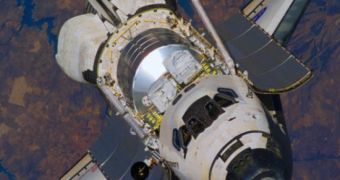In preparation for its 36th mission in orbit, the space shuttle Discovery was positioned on its launch pad on Wednesday, in an operation that went without a hitch. The shuttle will launch from the 39A pad on February 12th, carried by one of NASA's Apollo-era vehicles, which seem to be actually quite reliable for this type of mission. In preparation for the first manned spaceflight of 2009, NASA is struggling to ensure that everything goes according to plan, and that the shuttle is in prime condition for take-off.
During the 7 hours it took to maneuver the ship into position, the technicians and other crew members worked on their toes to make sure that nothing would damage the intricate piece of technology that is a space shuttle. The new mission will launch from Kennedy Space Center in Cape Canaveral, Florida, and its prime objective is to deliver a fourth starboard truss segment (ITS S6), as well as a fourth set of solar arrays and batteries to the International Space Station (ISS). In addition, it will also deal with more "administrative" issues, such as flight crew rotation, providing replacements for those currently on ISS.
"We had no issues once we started rolling. It was a beautiful rollout." Allard Beutel, who is a spokesman for NASA, told Space from Cape Canaveral. "The S6 truss is the last major piece of US-built hardware to go to the space station," he added, saying that the two new "solar wings" that would be mounted on the orbiting laboratory would be the final pieces required to supply the adequate amounts of power to the space station.
Discovery's latest mission, to be conducted by astronaut Lee Archambault, will last for an estimated two weeks, and will feature 4 spacewalks in total. During these incursions, the new elements will be added to ISS' infrastructure. Other maintenance work will also be performed, to keep the station as "fit" as possible, NASA said.
The 32,000-pound (14,514-kg) solar array truss segment will be mounted in Discovery's cargo bay on Saturday, while the crew will arrive at the base the following week, for rehearsals related to the mission plan. The importance of this mission is enormous, as the last stages of the ISS are nearing completion.
In addition to this flight, NASA has another 3 space flights programmed for this year, related to the ISS. All will deliver new modules, or will assist with crew rotation and resupply. The fifth planned flight will visit the Hubble Space Telescope, and conduct a final upgrade, before the shuttle program is scheduled to be closed down, in 2010.

 14 DAY TRIAL //
14 DAY TRIAL //